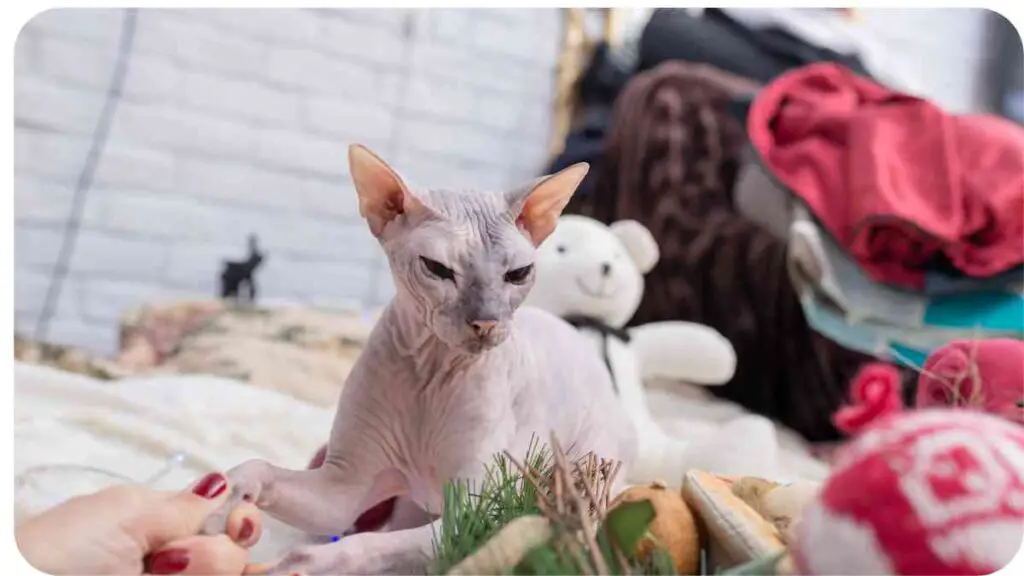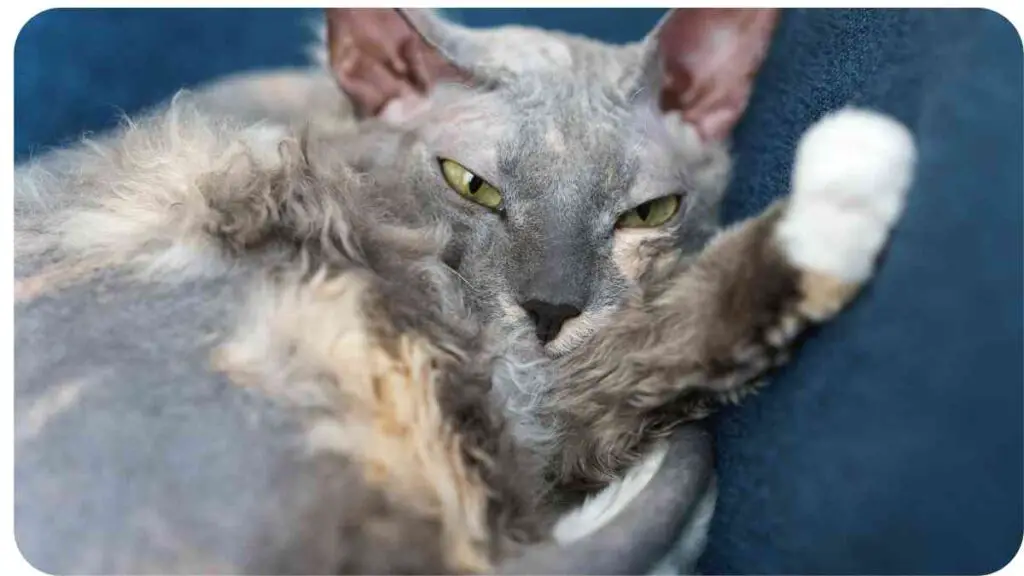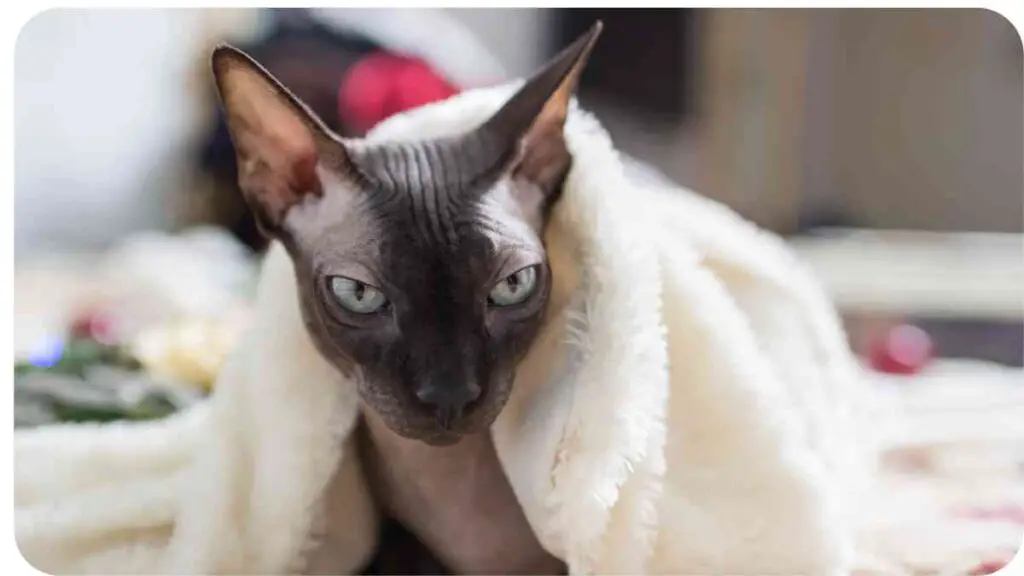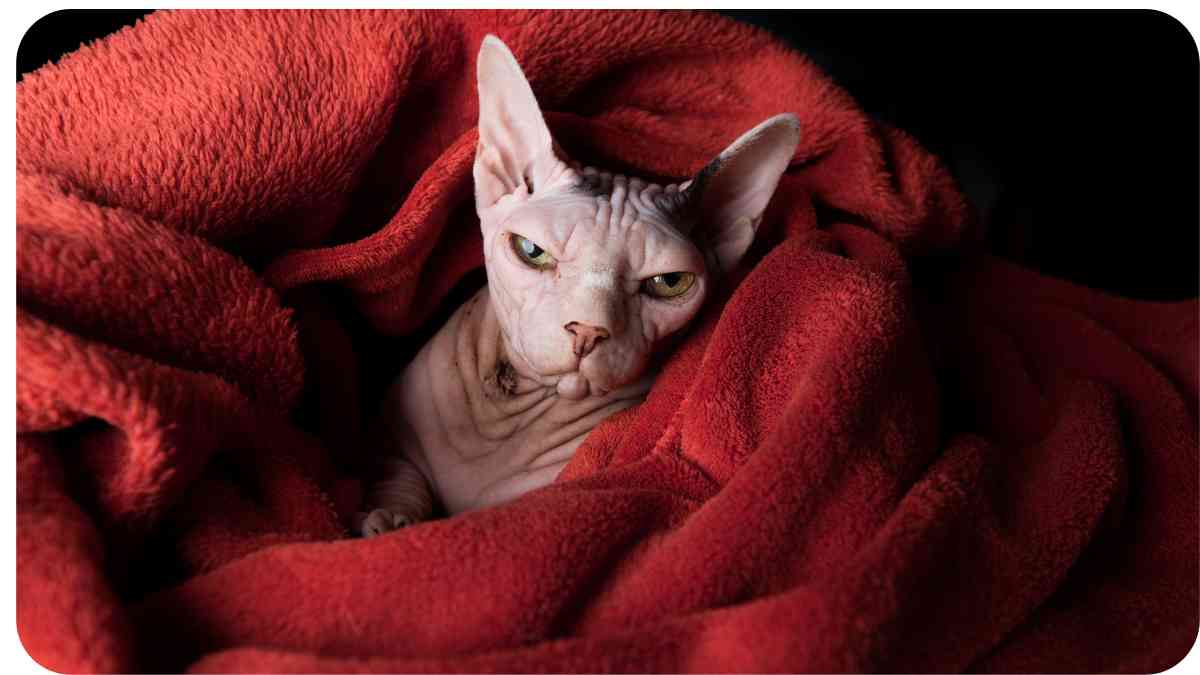Discovering the optimal weight range for your Sphynx cat is crucial for their overall well-being. In this comprehensive guide, we delve into the factors influencing a Sphynx cat’s weight, from genetics to diet, and provide practical tips to ensure your feline friend maintains a healthy body condition.
Whether you’re a seasoned Sphynx cat owner or considering bringing one into your home, understanding the intricacies of their weight dynamics is essential for their longevity and happiness.
| Takeaways |
|---|
| Sphynx cats have an average weight range of 8 to 12 pounds. |
| Factors such as genetics, diet, and overall health can influence a Sphynx cat’s weight. |
| It’s important to monitor a Sphynx cat’s weight to ensure they maintain a healthy body condition. |
| Regular veterinary check-ups and a balanced diet are key to managing a Sphynx cat’s weight. |
| If you’re concerned about your Sphynx cat’s weight, consult with a veterinarian for guidance and advice. |
Balanced Nutrition for Your Sphynx Cat
Feeding your Sphynx cat is a vital aspect of their overall well-being, directly impacting their weight. The average weight of a Sphynx cat is typically between 8 to 12 pounds, emphasizing the importance of balanced nutrition. To avoid weight gain, it’s essential to provide the right amount of food. As a general guideline, aim to feed your Sphynx cat about 2 ounces of food per day. However, factors like age and activity level can influence this quantity.
Considering these factors ensures that your Sphynx cat receives the appropriate caloric intake for their individual needs. Adjusting the portion size based on their lifestyle helps prevent overfeeding, promoting a healthy weight and overall vitality. Regular monitoring and consulting with your veterinarian can further fine-tune their dietary requirements for optimal well-being.
When it comes to cat breeds, Sphynx cats are known for their unique appearance and charm. If you’re curious about the weight of other cat breeds, you might be interested in learning how much a full-grown Russian Blue cat weighs. Discover the fascinating differences in cat weights across breeds!
Nutritional Pitfalls

Wondering why your Sphynx cat is gaining weight? The answer lies in their diet, particularly the quality and quantity of treats or human food they may be consuming. It’s essential to recognize that cats have unique nutritional needs and should not be treated like humans when it comes to their diet.
Excessive treats or human food can contribute to obesity and various health issues for your pet. As a guideline, treats should only constitute 5% of your Sphynx cat’s overall diet, and even then, they are best used as occasional training rewards.
If you’ve been regularly indulging your cat with treats, it’s advisable to cut them out completely. This adjustment can help your Sphynx cat shed excess weight and maintain a healthier, more balanced diet.
Choosing the Right Cat Food
While dry food might seem like a cost-effective option for pet owners, it can pose significant health risks for your cherished Sphynx cat. The high calorie and carbohydrate content in dry food are primary contributors to weight gain and obesity in cats.
For a healthy diet, aim for around 10-15% of protein calories, translating to approximately 20-30 grams of meat per day. Dry food’s low moisture content demands more energy for digestion, making it less ideal than wet food.
Especially for cats with diabetes, wet food is recommended for its ability to regulate glucose levels, thanks to its higher fiber content compared to dry kibble. Fortunately, the market offers various options that not only contribute to weight management but also provide flavorful alternatives for your Sphynx cat’s enjoyment.
Feeding your Sphynx cat the right diet is essential for their overall health and well-being. If you’re wondering what food is best for Sphynx cats, our comprehensive guide on the best food for Sphynx cats provides valuable insights and recommendations to keep your feline friend nourished and satisfied.
Calorie Control for a Healthy Sphynx Cat

Maintaining a watchful eye on your Sphynx cat’s daily calorie intake is crucial for their overall health. Unlike weight, which measures the amount of matter, calories represent the energy your cat consumes. An average Sphynx cat, weighing around 10 pounds, requires approximately 200 calories per day to sustain its ideal weight.
To calculate your cat’s calorie needs, use the convenient calculator provided by Purina. For adult cats, multiply their weight by 1.5 or 2, depending on whether you’re opting for maintenance or growth food (assuming growth). If your cat is under 10 pounds, adjust by multiplying its size by 0.9. While initial calculations may seem unfamiliar, these estimates are based on averages from similar-sized pets, ensuring a tailored approach.
| Cat Breed | Daily Calorie Intake (in kcal) |
|---|---|
| Maine Coon | 250 – 350 |
| British Shorthair | 200 – 300 |
| Siamese | 200 – 300 |
| Ragdoll | 250 – 350 |
| Bengal | 300 – 400 |
Genetics and Feline Weight
Curious about whether some cats are genetically predisposed to being overweight? The answer is yes, with varying percentages revealed in different studies. One study, focusing on cats over 7 years old, discovered that approximately 68% were overweight or obese, while 17% were underweight.
Another study evaluated cats based on a body condition score from 1-9, where 1 is emaciated and 9 is morbidly obese. Results showed that around 58% had a score of 5 or above, and 24% scored under 3, indicating emaciation.
Notably, these studies centered around pet cats receiving routine veterinary care, emphasizing the impact of lifestyle and owner involvement. A specific study on Sphynx cats found that 64% of adults aged 1-5 years exceeded their ideal weight according to breed standards.
Maintaining Activity Levels in Aging Sphynx Cats
As Sphynx cats age, their activity levels naturally decline compared to their younger counterparts. This decline aligns with reduced agility, limiting their ability to jump or climb as vigorously as before. Additionally, older Sphynx cats are less likely to engage in active play with toys, opting for more restful periods instead.
Increased sleep duration often accompanies this shift, indicative of a more sedentary lifestyle in senior cats. Recognizing these changes is essential for providing appropriate care and stimulation to maintain their overall well-being.
| Cat Breed | Activity Level |
|---|---|
| Maine Coon | Moderate |
| British Shorthair | Low |
| Siamese | High |
| Ragdoll | Low |
| Bengal | High |
Managing Weight in Sphynx Cats
Being a Sphynx cat owner comes with the awareness that these unique felines are prone to obesity. The absence of fur, acting as a natural insulator, exposes them to challenges in regulating body temperature. Sphynx cats easily absorb heat in warm weather and lose it gradually in colder conditions, potentially heightening susceptibility to diabetes and heart disease compared to other breeds.
To ensure your Sphynx cat attains and maintains a healthy weight, focus on feeding high-quality food in moderate amounts at regular intervals throughout the day. It’s crucial to monitor their food intake closely, especially in the initial stages of weight management. If your cat doesn’t finish a meal within approximately 15 minutes, consider removing it to prevent overeating and support their journey towards a balanced and healthy weight.
Maintaining proper hygiene is crucial for the health and comfort of Sphynx cats. If you’ve ever wondered how often you should wash your Sphynx cat, our detailed article on bathing frequency for Sphynx cats offers practical tips and guidelines to keep your feline companion clean and happy.
Indoor Exercise Solutions for Sphynx Cats

While your Sphynx cat has a natural inclination for play, it can be challenging for them to find suitable spaces indoors. Sphynx cats thrive with ample outdoor time, where they can roam freely, climb trees, jump, hunt for food, and engage with other cats if you have multiple pets.
If outdoor access is restricted, your Sphynx cat may experience boredom and restlessness indoors, potentially leading to behaviors like excessive grooming or aggression towards people or other animals in the household.
Combatting Sedentary Habits in Sphynx Cats
The distinctive feature of the Sphynx cat, its lack of hair, is not the only factor that sets it apart from other breeds. Your charming feline is likely to lead a sedentary lifestyle, which can contribute to weight gain.
Monitoring your cat’s weight is crucial to ensure they maintain a healthy level. Understanding what “sedentary” means in the context of cats is essential—it refers to a lifestyle lacking in activity, with minimal exercise or stimulation, such as toys and playtime with humans.
In simple terms, if your Sphynx cat spends most of their day sleeping without much activity, they could quickly become overweight. The good news is that as a dedicated pet parent, there are proactive steps you can take to prevent this and encourage a healthier, more active lifestyle for your beloved Sphynx cat.
Understanding the average life expectancy of Sphynx cats can help you make informed decisions about their care and ensure their well-being. Explore our informative resource on the average life expectancy of Sphynx cats to learn more about the factors that influence their lifespan and how to promote their longevity.
Balancing Indoor Comfort with Outdoor Adventure for Sphynx Cats
While Sphynx cats, like all felines, have an inherent need for outdoor exploration, their safety should be a top priority. It’s advisable for your Sphynx cat to spend at least half of their time outdoors, as it aligns with their natural instincts as hunters and explorers.
To ensure their safety, consider creating a secure outdoor space, either fenced-in or supervised on a leash. Supervision is crucial; never leave your cat unsupervised during outdoor activities.
Outdoor time offers opportunities for engaging activities like playing fetch or hide-and-seek, contributing to both physical fitness and mental stimulation. Striking a balance between indoor comfort and outdoor adventures is key to keeping your Sphynx cat both fit and entertained.
| Cat Breed | Indoor Time | Outdoor Time |
|---|---|---|
| Maine Coon | High | Low |
| British Shorthair | High | Low |
| Ragdoll | High | Low |
| Sphynx | High | Low |
| Persian | High | Low |
Navigating Cat Weight
If you’re questioning whether your Sphynx cat is overweight, it’s essential to recognize that appearances can be deceiving. Sphynx cats, like other felines, can carry extra weight while still looking healthy.
Cats differ significantly from humans in their ability to handle weight variations without immediate health impacts. While a Sphynx cat may appear healthy despite being overweight, it’s crucial to consider potential long-term risks.
Overweight cats face increased risks of developing conditions such as diabetes and arthritis later in life. If you have concerns about your Sphynx cat’s weight, whether you already own one or are planning to bring one into your home, consulting with a veterinarian is crucial. Veterinarians can provide tailored diet plans to ensure your cat maintains a healthy weight throughout its lifetime.
Bathing is an important aspect of caring for Sphynx cats, but you may be wondering how often they need to be bathed. Our comprehensive guide on bathing frequency for Sphynx cats provides useful information and practical recommendations to help you maintain your cat’s cleanliness and skin health.
Conclusion
In conclusion, maintaining your Sphynx cat’s weight within a healthy range is paramount for her overall well-being. If she is currently overweight, proactive monitoring and measures to prevent further weight gain are crucial.
For those whose cats are already at a healthy weight, continuing with the established practices is key to sustaining their well-being. Regularly assessing your cat’s weight and overall health is a responsible approach.
Should you find yourself uncertain about your Sphynx cat’s weight status or if weight loss is necessary, seeking guidance from your veterinarian is highly recommended. Veterinarians can provide personalized advice and tailored plans to ensure your feline companion leads a healthy and happy life.
Further Reading
Here are some additional resources for further reading on Sphynx cats:
Purina Australia – Sphynx Cat Breed: Purina Australia provides detailed information about the Sphynx cat breed, including their unique characteristics, care requirements, and health considerations.
Daily Paws – Sphynx Cat Breed Profile: Daily Paws offers a comprehensive breed profile on Sphynx cats, covering their history, appearance, personality traits, and tips for providing the best care.
Sphynx Lair Forum – How Much Does Your Sphynx Weigh?: The Sphynx Lair community forum thread discusses the topic of Sphynx cat weights, providing insights and experiences from fellow Sphynx cat owners.
FAQs
Here are some frequently asked questions about Sphynx cats:
What are the unique characteristics of Sphynx cats?
Sphynx cats are known for their hairless appearance, wrinkled skin, and large ears. They have an active and playful personality, often described as being curious and social.
Do Sphynx cats require special care for their skin?
Yes, due to their lack of fur, Sphynx cats have special skin care needs. Regular bathing to remove excess oils and routine moisturizing are important to keep their skin clean and healthy.
Are Sphynx cats hypoallergenic?
While Sphynx cats are often considered hypoallergenic, they can still produce allergenic proteins found in their saliva and skin. It’s recommended for individuals with allergies to spend time with a Sphynx cat to determine their personal reaction.
Are Sphynx cats more prone to certain health issues?
Sphynx cats are generally healthy, but they can be more susceptible to temperature sensitivity, sunburn, and skin-related conditions. Regular veterinary check-ups and proper environmental management are essential for their well-being.
How should I keep my Sphynx cat warm?
Sphynx cats lack fur insulation, making them more sensitive to cold temperatures. Providing them with warm blankets, clothing, and maintaining a comfortable indoor environment are crucial to keeping them warm and cozy.

I’m Dr. Hellen James, a veterinarian who has spent her career working with cats and has seen firsthand how important it is to understand each breed’s unique needs.


